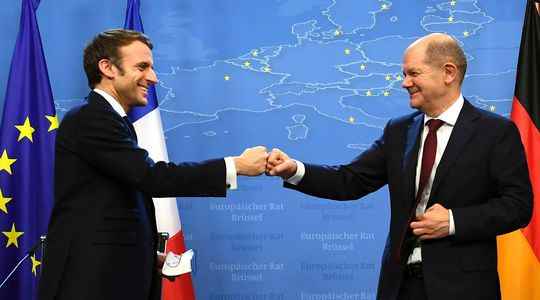If Europe still does not have a telephone number, as Henry Kissinger already deplored fifty years ago, it now has a mailbox. Earlier this month, Russia sent 27 letters to European capitals to reflect on a new security order on the continent. Head of Russian diplomacy for fifteen years, the Machiavellian Sergei Lavrov once again wanted to press on the divisions of the European Union. But, against all odds, on February 10, Vladimir Putin’s lieutenant received only one and only one letter in response, sent by the EU’s high representative, Josep Borrell.
If the content of the missive remains secret, the message could not be clearer: in the face of threats from Putin and his 125,000 men massed on the Ukrainian border, the Twenty-Seven are one. “On the question security, to Putin’s surprise, the European front is completely united against him, underlines François Heisbourg, special adviser at the Foundation for Strategic Research. The Russians are facing a set of states that are all saying the same thing, there is not a single hiccup.”
Coordinated, Europeans close ranks behind Ukraine
Kiev, Moscow, Washington, Brussels… At the beginning of February, European heads of state are on the move, their phones hanging from their ears. “With the risk of a war on its borders, Europe cannot remain absent from this Ukrainian crisis, its own security is at stake”, points out Nicole Gnesotto, vice-president of the Jacques Delors Institute. Not a day goes by without a videoconference between heads of state or a summit between foreign ministers. Even the very eurosceptic Viktor Orban coordinated with Emmanuel Macron before and after his own visit to Moscow on February 1. Result, the Hungarian Prime Minister, although close to Putin, also remains firm in the face of the demands of the Kremlin: no European country agrees to close the doors of NATO to Ukraine, and all close ranks behind Kiev .
The Europeans are aware that unity is their strength, but that their numbers complicate maneuvers. “In Russia, a single man makes the decisions, while we are twenty-seven countries, with the addition of democratic control of our institutions, notes a French minister. It is the size of our system, and its complexity.” Especially since, on the continent, foreign policy remains largely a national prerogative. “There may be a perception of scattering, but ultimately Europeans are all looking in the same direction,” says Alexandra de Hoop Scheffer, director of the Paris office of the German Marshall Fund.
To bring order to its foreign policy, the EU has had an External Action Service (EEAS) and a High Representative since 2011. But the Spaniard Josep Borrell, current holder of the post, has neither the title nor the leeway of a European Minister of Foreign Affairs. When he speaks, it is above all a sign that the Twenty-Seven have managed to find their point of balance, because the treaties provide that any decision in terms of foreign policy must be taken unanimously.
Capitals at the forefront of the diplomatic whirlwind
“The European system works with people who must be able to speak with one voice, but who can continue to speak on their own,” summarizes Pierre Vimont. The career of this seasoned diplomat illustrates this double reality: he headed the EEAS until 2015, but it was as an emissary of Emmanuel Macron that he recently traveled to Moscow to negotiate with Russians. “I report to the French president, but I go there with the support of other Europeans,” he deciphers.
In fact, in the Ukrainian crisis, the whirlwind of diplomacy gives pride of place to heads of state: the presidents of the Commission and of the European Council remain in the background, while the press conferences of Olaf Scholz, Emmanuel Macron or President polish Andrzej Duda are daily. “There is a division of labor between the European capitals, with Paris in the lead, which leads the diplomatic efforts and the EU which acts on the sanctions aspect and on energy supply”, notes Alexandra de Hoop Scheffer.
Behind the scenes, Brussels plays the role of a control tower in the eyes of diplomats. “To face the challenges of today’s world, size matters”, underlines the Italian Stefano Sannino, the current secretary general of the service for external action. Every week, the Europeans meet several times in the Belgian capital in different formats, at NATO or the EU, and European diplomacy puts oil in the wheels. “We are here to put the church back in the middle of the village and create convergence despite different sensitivities, explains Stefano Sannino. We are not in the minds of European leaders when they see Putin, but everyone interprets the principle in their own way. of ‘loyal cooperation’ between us, provided for in the treaties.”
As long as the threat remains at the borders, this European “cooperation” holds. But in the event of an attack on Ukraine, the Europeans will have to bring a response – economical – coordinated in a few hours, and the compromise on the details has not yet been found. The Germans are reluctant to abandon the Nord Stream 2 gas pipeline, which connects them directly to Russia; Austrians and Hungarians are concerned about the effects of a severance of commercial ties with Moscow, and Italy does not want to exclude Russians from the Swift international payment system. “These discussions on sanctions are extremely difficult, because each country defends its own interests above all,” observes François Heisbourg. For European unity, the toughest test is probably yet to come.
